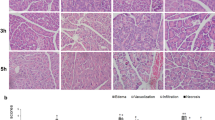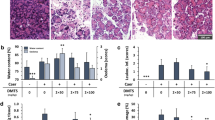Abstract
A number of investigators have demonstrated that the preinduction of heat-shock protein (HSP) expression (particularly HSP60 and HSP72) by hyper- or hypothermia may have a protective effect against cerulein-induced acute pancreatitis. The aim of the present study was to induce HSPs in the pancreas and lungs by thermal (hot-water immersion, HWI) and nonthermal methods (injection of sodium arsenite intraperitoneally) and to investigate the potential effects of HSP preinduction on cholecystokinin-octapeptide (CCK) induced acute pancreatitis and pancreatitis-associated lung injury in rats. The dose–response and time–effect curves observed following HWI and sodium arsenite treatments were evaluated. Animals were injected with 3 × 75 μg/kg CCK subcutaneously at intervals of 2 hr at the peak level of HSP synthesis, as determined by Western blot analysis. The rats were killed by exsanguination through the abdominal aorta 2 or 6 hr after the last CCK injection. HWI and the injection of sodium arsenite significantly elevated the expression of HSP72 in the pancreas and lungs, whereas they did not influence the levels of HSP60. Overall, HWI pretreatment had a protective effect against CCK-induced pancreatitis and pancreatitis-associated lung injury. In contrast, the nonthermal preinduction of HSP72 by sodium arsenite did not result in any beneficial effects on the measured parameters of the disease. The findings suggest that the preinduction of HSP72 is not sufficient to protect against CCK-induced acute pancreatitis and pancreatitis-associated lung injury or that the beneficial effect of hyperthermia may not be exclusively related to HSP72 expression.
Similar content being viewed by others
REFERENCES
Lindquist S: The heat-shock response. Annu Rev Biochem 55:1151–1191, 1986
Welch WJ: Mammalian stress response: Cell physiology, structure/function of stress proteins, and implications for medicine and disease. Physiol Rev 72:1063–1081, 1992
Cechetto JD, Soltys BJ, Gupta RS: Localisation of mitochondrial 60-kD heat shock chaperonin protein (HSP60) in pituitary growth hormone secretory granules and pancreatic zymogen granules. J Histochem Cytochem 48:45–56, 2000
Wagner AC, Weber H, Jonas L, Nizze H, Strowski M, Fiedler F, Printz H, Steffen H, Göke B: Hyperthermia induces heat shock protein expression and protection against ceruleininduced pancreatitis in rats. Gastroenterology 111:1333–1342, 1996
Frossard JL, Pastor CM, Hadengue A: Effect of hyperthermia on NF-kappaB binding activity in cerulein-induced acute pancreatitis. Am J Physiol 280:G1157–G1162, 2001
Otaka M, Itoh H, Kuwabara T, Zeniya A, Fujimori S, Otani S, Tashima Y, Masamune O: Induction of heat shock protein and prevention of cerulein-induced pancreatitis by waterimmersion stress in rats. Int J Biochem 26:805–811, 1994
Otaka M, Okuyama A, Otani S, Jin M, Okayama A, Itoh S, Iwabuchi A, Sasahara H, Itoh H, Tashima Y, Komatsu M, Masamune O: Differential induction of HSP60 and HSP72 by different stress situations in rats. Dig Dis Sci 42:1473–1479, 1997
Lee HS, Bhagat L, Frossard JL, Hietaranta A, Singh VP, Steer ML, Saluja AK: Water immersion stress induces heat shock protein 60 expression and protects against pancreatitis in rats. Gastroenterology 119:220–229, 2000
Kruger B, Weber IA, Albrecht E, Mooren FC, Lerch MM: Effect of hyperthermia on premature intracellular trypsinogen activation in the exocrine pancreas. Biochem Biophys Res Commun 282:159–165, 2001
Sramek P, Simeckova M, Jansky L, Savlikova J, Vybiral S: Human physiological responses to immersion into water of different temperatures. Eur J Appl Physiol 81:436–442, 2000
Roine R, Luurila OJ, Soukas A, Heikkonen E, Koskinen P, Ylikahri R, Toivonen L, Harkonen M, Salaspuro M: Alcohol and sauna bathing: Effects on cardiac rhythm, blood pressure, and serum electrolyte and cortisol concentrations. J Intern Med 231:333–338, 1992
Alexandrova M, Farkas P: Stress-induced changes of glucocorticoid receptor in rat liver. J Steroid Biochem Mol Biol 42:493–498, 1992
Ribeiro SP, Villar J, Downey GP, Edelson JD, Slutsky AS: Sodium arsenite induces heat shock protein-72 kilodalton expression in the lungs and protects rats against sepsis. Crit Care Med 22:922–929, 1994
Goa J: Microbiuret method for protein determination of total protein in cerebrospinal fluid. Scand J Clin Lab Invest 5:218–222, 1953
Laemmli UK: Cleavage of structural proteins during the assembly of the head of bacteriophage T4. Nature 227:680–685, 1970
Rakonczay Z Jr, Takács T, Mándi Y, Iványi B, Varga I, Pápai G, Boros I, Lonovics J: Water immersion pretreatment decreases pro-inflammatory cytokine production in cholecystokinin-octapeptide-induced acute pancreatitis in rats: possible role of HSP72. Int J Hyperthermia 17:520–535, 2001
Kurucz I, Tombor B, Prechl J, Erdö F, Hegedüs E, Nagy Z, Vitai M, Korányi L, Laszló L: Ultastructural localization of HSP-72 examined with a new polyclonal antibody raised against the truncated variable domain of the heat shock protein. Cell Stress Chaperones 4:139–152, 1999
Arden LA, de Groot ER, Shaap OL: Production of hybridoma growth factor by human monocytes. Eur J Immunol 17:1411–1416, 1987
Nagy I, Pap Á, Varró V: Time-course of changes in pancreatic size and enzyme composition in rats during starvation. Int J Pancreatol 5:35–45, 1989
Schneider WC: Determination of nucleic acids in tissues by pentose analysis. Methods Enzymol 3:680–684, 1957
Giles KW, Myers A: An improved diphenylamine method for the estimation of deoxyribonucleic acid. Nature 206:93, 1965
Kuebler WM, Abels C, Schuerer L, Goetz AE: Measurement of neutrophil content in brain and lung tissue by a modified myeloperoxidase assay. Int J Microcirc Clin Exp 16:89–97, 1996
Schafer C, Williams JA: Stress kinases and heat shock proteins in the pancreas: Possible roles in normal function and disease. J Gastroenterol 35:1–9, 2000
Wong HR, Wispe JR: The stress response and the lung. Am J Physiol 273:L1–L9, 1997
Brown IR, Rush SJ: Induction of “stress” proteins in intact mammalian organs after the intravenous administration of sodium arsenite. Biochem Biophys Res Commun 120:150–155, 1984
Wijeweera JB, Gandolfi AJ, Parrish A, Lantz RC: Sodium arsenite enhances ap-1 and NFkappa B DNA binding and induces stress protein expression in precision-cut rat lung slices. Toxicol Sci 61:283–294, 2001
Lampel M, Kern HF: Acute interstitial pancreatitis in rats induced by excessive doses of a pancreatic secretagogue. Virchows Arch 373:97–113, 1977
Bhagat L, Singh VP, Hietaranta AJ, Agrawal S, Steer ML, Saluja AK: Heat shock protein 70 prevents secretagogueinduced cell injury in the pancreas by preventing intracellular trypsinogen activation. J Clin Invest 106:81–89, 2000
Groblewski GE, Grady T, Mehta N, Lambert H, Logsdon CD, Landry J, Williams JA: Cholecystokinin stimulates heat shock protein 27 phosphorylation in rat pancreas both in vivo and in vitro. Gastroenterology 112:1354–1361, 1997
Author information
Authors and Affiliations
Rights and permissions
About this article
Cite this article
Rakonczay, Z., Mándi, Y., Kaszaki, J. et al. Induction of HSP72 by Sodium Arsenite Fails to Protect Against Cholecystokinin–Octapeptide-Induced Acute Pancreatitis in Rats. Dig Dis Sci 47, 1594–1603 (2002). https://doi.org/10.1023/A:1015883522648
Issue Date:
DOI: https://doi.org/10.1023/A:1015883522648




